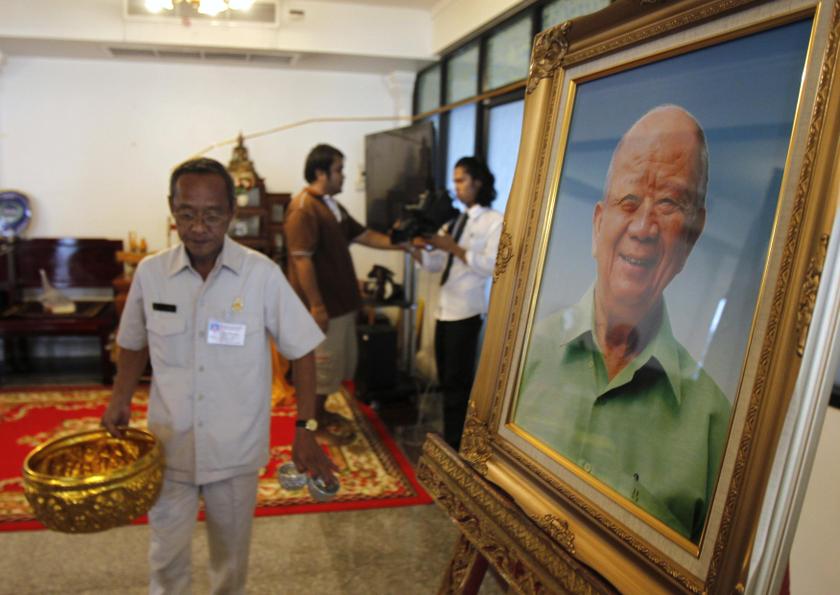KUALA LUMPUR, Sept 21 — The world will laugh at Malaysia if Putrajaya insists on not allowing Chin Peng’s remains to be buried in his home country here, former top cop Tan Sri Abdul Rahim Mohd Noor has said.
Abdul Rahim — who had led the peace negotiations between Malaysia and the Malayan Communist Party (CPM) as the Special Branch chief then in the late 1980s — said it was unfair to ban Chin Peng from the country, noting that other Malay former communists have been allowed to return home.
“If the government — the authorities — succumb to this public pressure not to allow Chin Peng’s ashes to be brought back, I think, we are making Malaysia a laughing stock to the whole world,” Abdul Rahim said in an interview aired on business station BFM yesterday.
“If you say that Chin Peng as secretary-general of the party (CPM) is the highest-most member, then he qualifies to get all the privileges, advantages or whatever promises made in the agreements, which includes for him to be allowed to come back,” he added, referring to the Hat Yai Peace Accord in 1989.
The peace talks in the 1980s had led to the three-way peace treaty between the CPM and the Malaysian and Thai governments that allow CPM members, who have laid down their arms, to return to Malaysia if they so desired.
Abdul Rahim, a former inspector-general of police, said it was “grossly unfair” that Chin Peng had not been allowed to return to Malaysia permanently or to even make social visits, pointing out that CPM chairman Abdullah CD was even given an audience with Perak Sultan.
“Rashid Maidin, I was told, performed his pilgrimage through KL with the help of the Malaysian authorities. What’s all this?” said Abdul Rahim, referring to the CPM central committee member.
MCA urged Putrajaya again yesterday to allow Chin Peng’s burial in Malaysia, hinting that the government’s refusal to let the ethnic Chinese’s remains enter the country could be viewed as a racially motivated decision.
Datuk Heng Seai Kie, publicity chief of the Barisan Nasional (BN) Chinese party, pointed out that two Malay suspected terrorists who were allegedly behind the bombings in Bali and Jakarta — Dr Azahari Husin and Nordin Mohamad Top had been buried in Malaysia.
Abdul Rahim also said yesterday that the argument against allowing Chin Peng to be interred in Malaysia was “a bit naïve”, but stressed that he would not presume the ban was made along racial lines.
“As far as Chin Peng’s case is concerned, we created a situation where we made a mockery of the agreements,” he said.
Abdul Rahim also warned that barring Chin Peng’s burial from his hometown in Sitiawan, Perak, would make the once-feared communist leader an icon.
“Specifically, I think it is not good for the ruling party, particularly in their attempts post the 13th general election, to win back Chinese Malaysian support,” he said.
Abdul Rahim said that Chin Peng, the man born Ong Boon Hua, should be remembered for his role and the CPM’s role in fighting against British colonial rule.
Chin Peng died in Bangkok, Thailand, on Monday at the age of 88 after spending his final years there in exile.
Chin Peng’s last wish was to be buried in Sitiawan, but Putrajaya had strongly rejected the idea immediately after his death, with Prime Minister Datuk Seri Najib Razak labelling him a “terrorist leader that waged war on the nation”.
Chin Peng’s aide had reportedly confirmed that the former CPM secretary-general will be cremated according to Buddhist rites in Bangkok next Monday.
Yesterday, Najib said Putrajaya will not send representatives to attend Chin Peng’s funeral and insisted that the government will not allow his remains to enter Malaysia.
“We do not pay respects to people who are responsible for the deaths of thousands of people,” he said, referring to the decades-long bloody insurgency by the Communists that lasted until the Hat Yai Peace Accord in 1989.
Najib said he had personally gone through details of the accord, and confirmed that CPM members who agreed to the terms had to apply for citizenship within one year of the signing of the agreement.
“He refused to do that and did not do anything to pursue it, so his rights have expired. He has relinquished his rights,” he said of the government’s refusal to recognise Chin Peng as a Malaysian citizen.



















